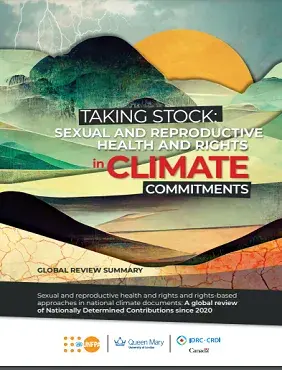Women, girls and marginalized groups who are largely dependent on natural resources for livelihoods are among the hardest hit by extreme weather patterns. These weather patterns limit their access to food, water, shelter, education and access to essential health services, including those that address sexual and reproductive health and rights (SRHR), gender-based violence (GBV) and preventing harmful practices such as child marriage and female genital mutilation. Emerging evidence shows the direct and indirect impacts of climate change on women, girls and marginalized groups and on their SRHR, as well as on GBV and harmful practices.
Family planning
Human rights
Taking stock: Sexual and Reproductive Health and Rights in Climate

Publisher
Number of pages
11
Author
UNFPA
Publication
Taking stock: Sexual and Reproductive Health and Rights in Climate
Publication date
05 February 2024

